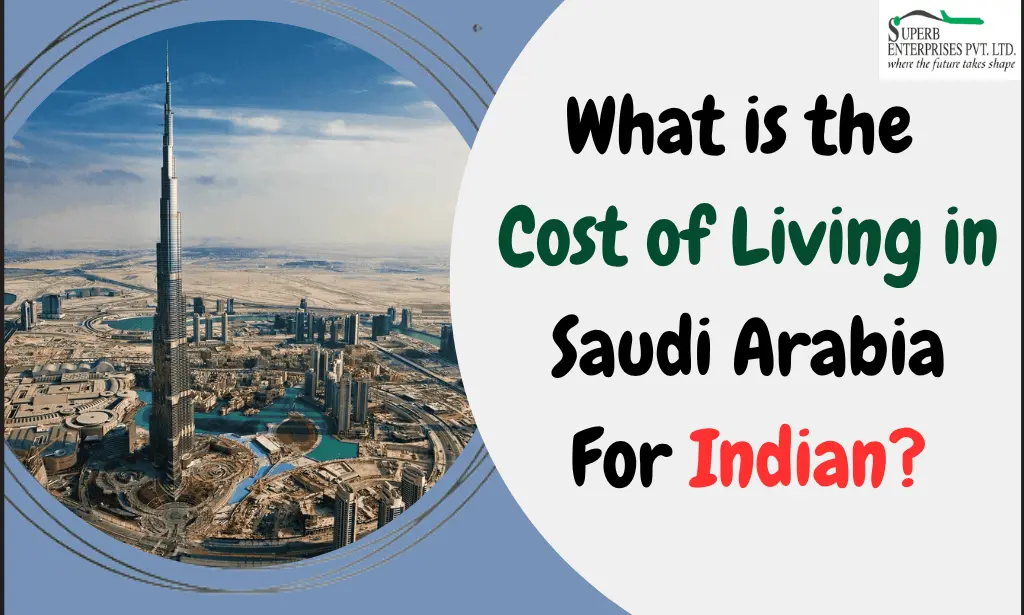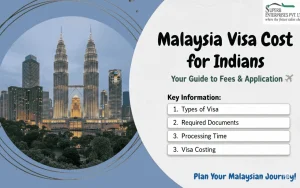The Kingdom of Saudi Arabia is a rapidly modernising country that has well incorporated Islamic tradition into the country’s cultural pattern. It continues to be one of the most popular places for Indian professionals, highly skilled workers, students, and families.
Better employment opportunities, developed infrastructure, and a high standard of living are some of the reasons adding to the popularity of the Kingdom. The tax-exempt income, expanding infrastructure, and a huge expat population also draw the attention of people worldwide.
However, one question that often comes up is, “How affordable is it to live in the kingdom?” In this blog, we will explore in detail the cost of living in Saudi Arabia in 2025.
Our focus will be on understanding the costs of housing, food, healthcare, and education. Read this blog post for a clearer understanding of all the costs involved. This is especially relevant for anyone considering a move to the Kingdom of Saudi Arabia.
Why More Indians Are Moving to Saudi Arabia
Before we get into the various cost-related details of living in Saudi Arabia, let’s understand what makes it such a special destination, especially for the Indian population.
- No personal income tax
- The increasing employment in various sectors such as construction, oil, healthcare, IT, and education
- An Islamic way of life and culture is a popular reason why many of the Indian Muslims prefer moving to Saudi Arabia
- Rising Indian population and cultural integration
- Better roads, developed infrastructure, and higher standards of living
The Saudi lifestyle is a perfect blend of traditional values and modern comforts that suits everyone, irrespective of whether you are a bachelor living alone or a family looking for stability.
Cost of Living in Saudi Arabia Overview
The cost of living in Saudi Arabia could vary significantly depending on the city of residence (e.g., Riyadh, Jeddah, Dammam, or Medina), lifestyle, and accommodation preference. Although Saudi Arabia is not one of the cheapest Gulf countries, it offers massive value, particularly with zero personal income tax and affordable utilities, amongst other things.
The major cities, such as Riyadh and Jeddah, have higher rent and living expenses as compared to other smaller towns. Essential items such as fuel, utilities, and basic food items are, however, sold at reasonable prices. A lot of expats enjoy a good life, and a number of companies provide accommodation, transport, as well as family services as part of their compensation package for international employees.
Average Monthly Cost of Living in Saudi Arabia
| Profile | Excluding Rent | Including Rent |
| Single Person | SAR 2000-3000 (INR 45-70k) | SAR 3500-5500 (INR 80-120k) |
| Family of Four | SAR 5000-7000 (INR 115-160k) | SAR 7000-11000 (INR 160-250k) |
These are average figures based on the general assumptions for large Tier-1 cities like Riyadh and Jeddah. The cost of living in smaller towns can be up to 20-30% lower than the aforementioned figures.
Housing and Rental Costs
Amongst the many things that make up the entire cost of living, rent is often the largest contributor. Expats living in Saudi Arabia have many options when it comes to housing. Popular options include apartments, villas, and gated expat compounds (popular among Western expats).
The cost of housing and rental varies mainly depending on the type of property and its location within the city. Here is a price breakdown;
| Accommodation Type | Cost in Riyadh (SAR) | Jeddah (SAR) | Dammam (SAR) |
| 1 BHK Apartment in the City Centre | 2,500 – 4,500 (55-100K INR) | 2,000 – 4,000 (45-90K INR) | 1,800 – 3,500 (40-80 INR) |
| 1 BHK Apartment Outside the City Centre | 1,500 – 2,800 (35-65K INR) | 1,400 – 2,500 (30-55K INR) | 1,200 – 2,300 (25-50K INR) |
| 3 BHK in the City Centre | 4500 – 8000 (100-180K INR) | 4000 – 7000 (90-160K INR) | 3500 – 6500 (80-150K INR) |
| Shared Accommodation (per person) | 600 – 1000 (14-23K INR) | 600 – 800 (14-18K INR) | 500 – 800 (12-18K INR) |
Certain organisations provide free or even subsidised housing to their employees. It is especially the case for skilled workers, doctors, and engineers. The housing subsidiary or free house can reduce the monthly expenses by 20-35%.
Grocery and Food Costs
In Saudi Arabia, Indian produce is easily available at competitive prices. The retail space in the Kingdom is generally dominated by hypermarket chains such as Lulu, Danube, Carrefour, and Panda. Here is a list of everyday goods for your reference;
- Milk (1L) – SAR 6
- Eggs (A dozen) – SAR 10
- Basmati Rice – SAR 8
- Chicken (1kg) – SAR 15-22
- Tomatoes (1 kg) – SAR 3
- Wheat Flour (5kg) – SAR 20-25
- Bread (Loaf) – SAR 2-3
- Potatoes (1kg) – SAR 2-4
- Onions (1kg) – SAR 2-3
- Cooking Oil (1L Sunflower) – SAR 8-12
- Apples (1kg) – SAR 6-9
- Bananas (1kg) – SAR 5-7
- Yoghurt (500g) – SAR 4 – 6
The average monthly cost of groceries largely ranges around SAR 400-600 for bachelors living alone and could be anywhere from SAR 1000 to 1500 for a family of four.
Dining Out
- Local restaurant meal (individual) – SAR 15 – 30
- Indian/Asian buffet (per person) – SAR 25 – 60
- Dinner for Two (mid-range restaurant) – SAR 100 – 180
- Coffee – SAR 14-20
- Coke/Pepsi (12 oz small bottle) – 3-4 SAR
- McMeal at McDonald’s (or Equivalent Combo Meal) – SAR 30 – 35
Transport Costs
Despite the rising standards of public transport, particularly with the introduction of Metro in Riyadh, car ownership is the major means of transportation, thanks to subsidised fuel costs. Here is a detailed breakdown of the average transport cost incurred in Saudi Arabia;
- Petrol (Per Litre) – SAR 2-2.5
- Monthly Fuel Cost (average) – SAR 250-450
- Uber/Careem (short ride) – SAQ 12-25
- Monthly Metro Pass (Riyadh) – 120-200
- Car Lease (Monthly) – SAR 800-1300
Healthcare Costs
The Kingdom of Saudi Arabia is home to some of the most modern, world-class hospitals, clinics, and healthcare professionals. The cost of healthcare can be a bit expensive, but the expats need not worry as health insurance is compulsory, which greatly reduces the financial burden. Nonetheless, the following are the average costs of healthcare in Saudi Arabia;
| Healthcare Service | Cost (SAR) |
| GP Consultation (Private) | 100 – 200 |
| Specialist Visit | 200 – 500 |
| Pharmacy (Monthly) | 100 – 300 |
| Dental Check-up | 150 – 300 |
The total cost of healthcare can add up to a large amount. The public hospitals are much more affordable; however, the wait times there can be pretty long and gruelling. The private hospitals like King Faisal Specialist Hospital and Dr. Sulaiman Al Habib are widely preferred by expats living in Saudi Arabia.
Cost of Education
Common schooling choices among Indian expats are CBSE-affiliated schools and British or American curricula. The following table consists of the total breakdown of all the costs incurred in education in Saudi Arabia.
| Category | Cost (SAR) |
| Annual Tuition (CBSE) | 6,000 – 15,000 (140K-350K INR) |
| Annual Tuition (British/American) | 20,000 – 50,000 (460K – 1.15M INR) |
| Books, Uniforms, Transport | 2,000 – 4,000/year (45K – 90K INR) |
Cost of Living in Saudi Arabia Based on Profile
For a Single Person
- Rent – Based on the accommodation type, city, and location within the city, rent for a single person can range anywhere between SAR 1,500 – 2,500 per month.
- Food – It varies from person to person, but on average costs about SAR 400 – 600 every month.
- Transport – Depending on the mode of transport, the average monthly cost can be anywhere between SAR 300 – 500
- Miscellaneous – SAR 400 – 800
Total – Depending on the lifestyle and location, a single person can live comfortably in Saudi Arabia for about SAR 3,000 – 4,500 every month.
Family of Four
- Rent – Naturally, for families, the requirements are different and so are the costs. It would cost about SAR 4,000 – 6,500 every month to rent a suitable accommodation.
- Food – For a family of four, the monthly grocery bill can range between SAR 1,200 – 1,500.
- Education – Depends totally on the type of school and other miscellaneous costs, but families spend an average of SAR 1,000 – 3,000 every month on education.
- Transport & Misc – The Cost of running two cars in a family of four can end up costing about SAR 1,000 – 1,500.
Total – By spending roughly about SAR 7,000 – 11,000, families can easily afford to live in Saudi Arabia.
Salaries for Indian Expats in Saudi Arabia
Many indian origin professionals prefer moving to Saudi Arabia due to higher income opportunities. Earnings vary depending on the position, profession, and so on. Here are some of the average salaries earned by the said professionals in the kingdom;
| Job Category | Average Monthly Salary (SAR) |
| General Labour/Helpers | SAR 1,000 – 1,800 |
| Office/Admin Support | SAR 2,500 – 5,000 |
| Engineers/IT Professionals | SAR 6,000 – 12,000 |
| Professionals | SAR 7,000 – 20,000+ |
| Senior Executives/Managers | SAR 15,000 – 40,000+ |
The majority of companies provide benefits such as free housing, transport allowance, annual tickets, and medical insurance. All these benefits contribute to financial ease and considerably decrease the monthly expenditures.
Cost of Living Comparison
For Indian expatriates planning to move to Saudi Arabia, it is crucial to have a clear understanding of the costs associated with living in the Kingdom. The table below presents the costs in a very simple and straightforward manner.
| Category | Saudi Arabia | India |
| Rent | 4x-5x Higher | Much more affordable |
| Education | 5x-6x Costlier | Budget-friendly |
| Healthcare | On average, 6x costlier | Comparatively much inexpensive |
| Transport | 2x-3x higher than India | More affordable with more options for public transport |
| Salaries | 4x-5x higher on average | Lesser with somewhat limited growth opportunities |
Final Thoughts
Saudi Arabia is not just an oil economy anymore; it is a competitive market offering more opportunities, improved infrastructure, tax-free personal income, higher pay packages, and a much better quality of life. To Indian expats, the Kingdom presents an offer that is impossible to resist – modern amenities, reasonable savings opportunities, and familiar culture.
Rent and education may be expensive, but there is affordable healthcare, transportation, groceries, and tax-free income to make up for that. In case you are on the move, some financial planning and negotiation with the employer can go a long way in ensuring that your stay in the Kingdom of Saudi Arabia becomes rewarding.
Frequently Asked Questions
For a single occupant, a monthly salary of SAR 5,000 – 6,000 is good for leading a comfortable life. For a family of four, an average salary should be between SAR 10,000 – 14,000 for a comfortable life.
Yes, it is a family-friendly country, especially in cities such as Damman and Jeddah, with many malls, parks, family zones, and even women-only events and schools.
Property ownership in the kingdom is restricted for foreigners as of now. However, renting and leasing long-term is a common practice.
Yes. The Indian expatriates are one of the largest groups in Saudi Arabia, with their social clubs, cultural events, and so on. Indian groceries are also readily available.
The savings depend completely on the candidate’s expenditure habits and lifestyle. However, with zero income tax and added employer benefits, most expats working in Saudi Arabia save significantly compared to their home country.




